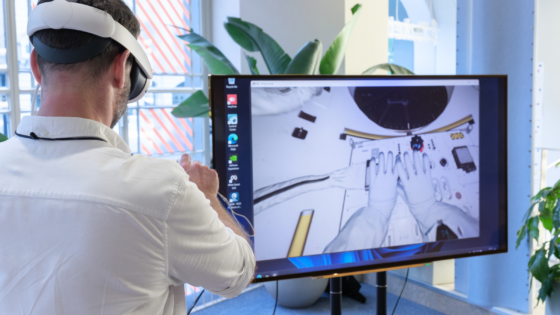In the wake of a plethora of announcements regarding hotel openings to expand the YOTEL portfolio, editor Hamish Kilburn sat down with the hotel brand’s CEO, Hurbert Viriot, to understand more about the company’s ethos and methods to grow…
It’s safe to say that the international hotel design and hospitality scene transformed dramatically in 2007 and 2008 – the exact cause of this is still up for discussion.
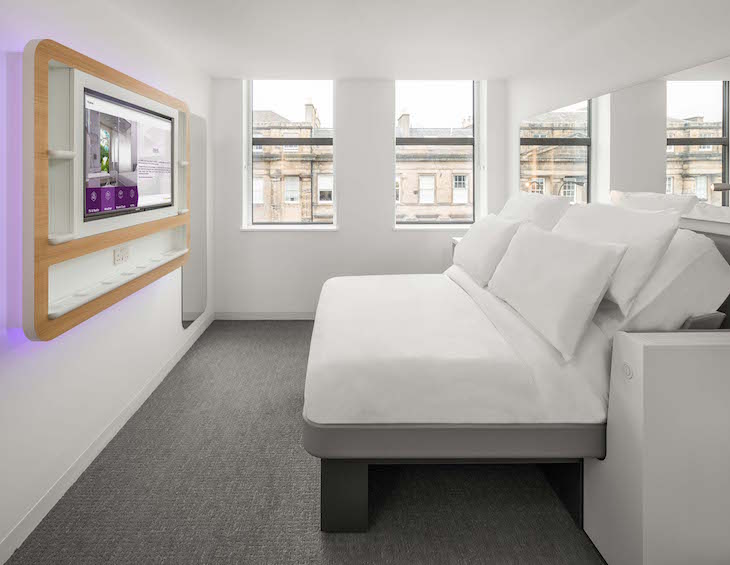
Undeniably, though, it was influenced by the financial crisis and driven largely by a change in behavior among frequent travellers, which resulted in the industry having to rethink its foundations.
One hotel group to react to this was YOTEL, which opened its debut property strategically within Gatwick Airport, the UK’s second busiest airport which last year recorded 46.1 million passengers pass through its terminal doors. “The original concept of YOTEL Air Gatwick was quickly followed by hotel openings in Heathrow and Amsterdam Schiphol,” said Hubert Viriot, CEO of YOTEL. “Essentially, it was in these three hotels where the business DNA was set.”
“Hotels that were built 10 years ago and beyond, they are very inefficient pieces of real estate.” – Hurbert Viriot, CEO, YOTEL.
Today, YOTEL is known globally for its comfortable and affordable hospitality offering; a modern hotel experience, it calls it, that shelters smart thinking, smart design and smart prices. The design concept is compact, and functional without changing lanes to look or feel budget. This design ethos of what the brand calls its cabins was led by the unique demand of a guest checking in to an airport or urban hotel. “Most people travel several times per year, and the average length of stay in our hotels is very short,” Viriot added. “They travel looking for an experience, and they are very well informed with access to smart phones etc. Their budget accommodation has reduced because people travel more often, and the structure of a ‘budget hotel’ is different. Formally, the bulk of your travel costs was transport and accommodation – and consumers would save a proportion of money left over for pleasure. That has changed, which is driving the industry to change with it.”
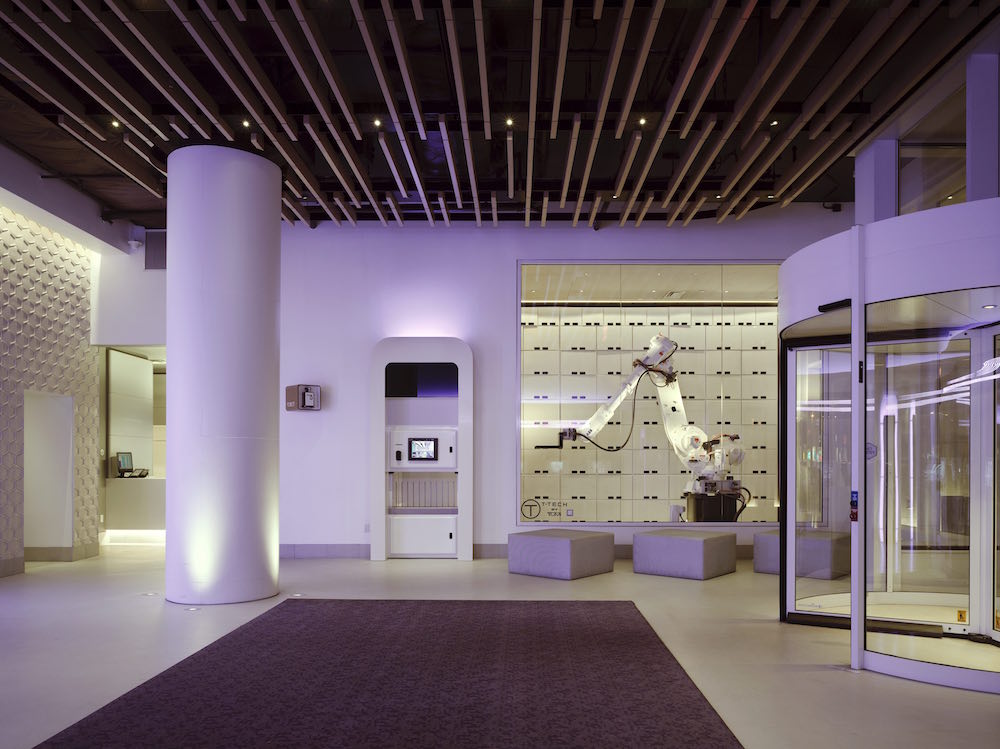
Image credit: YOTEL NYC
The launch of a fresh design hotel concept to cater for short-stay travellers looking a low-price point flipped the current hotel model on its head. “Hotels that were built 10 years ago and beyond, they are very inefficient pieces of real estate,” explains Viriot who is talking about large guestrooms and non-essential, low-income-generating retail and F&B areas. “Once we remove those areas and make the room or cabin design more compact without taking away the quality, then we are able to keep our room rates low.”
When it comes to the design details of any short-term hotel experience, the most important element to get right is bed. Inspired the lay-flat beds inside modern planes, YOTEL believed that including an adjustable smart bed, complete with cool action gel memory foam mattresses, was something its guests would appreciate. “The beds and mattress meet our customer requirements,” said Viriot. “You can recline and adapt the bed to your liking, so we had to find a mattress that also adapted in this way, as well as regulating the temperature of the body to ensure for a good night’s sleep. Ultimately it [YOTEL] is about providing those essential luxuries.”
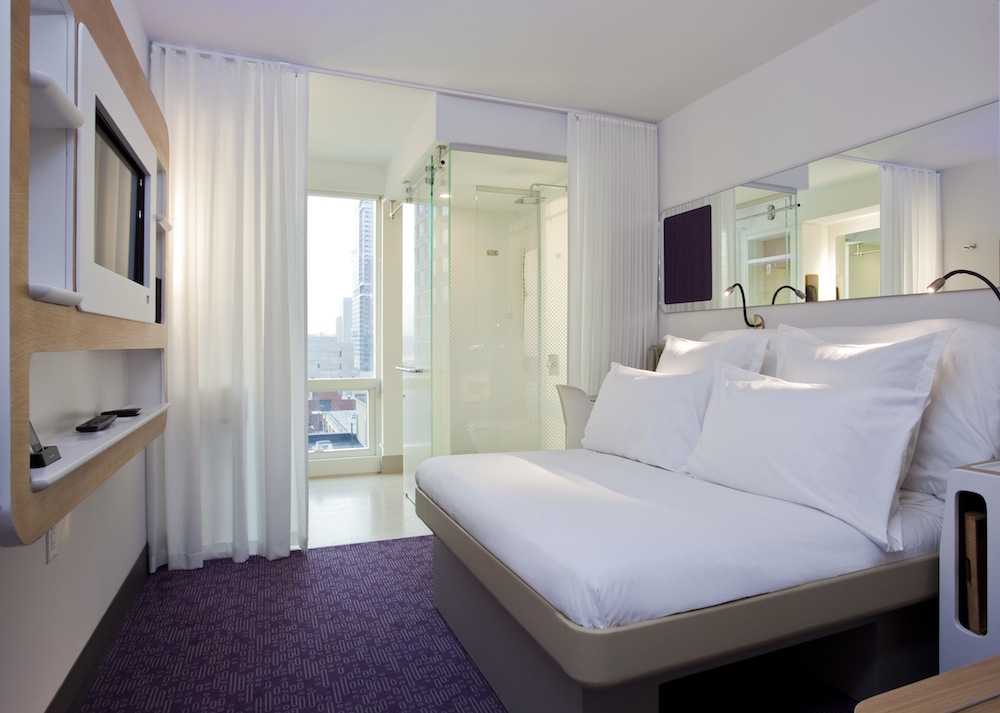
Image credit: YOTEL
Since the success of the modern airport hotels, the group has expanded into the hearts of cities, taking with it the compact design of guestrooms to ensure the room rates remain lower than competitors. But what is arguably more impressive is the group’s ability to design sustainable spaces, which is none more so apparent as it is inside the newly opened YOTEL Amsterdam Noord.
The brand’s first hotel in mainland Europe, YOTEL Amsterdam Noord is at the epicentre of the up-and-coming Buiksloterham neighbourhood, built on the sunny bank of the Tolhuis Canal. Home to start-ups and creative businesses, the area is also brimming with hip bars, experimental festivals and modern architecture, making it an ideal base for modern travellers.
As well as featuring the space-saving adjustable beds, the cabins are also equipped with refreshing amenities from Urban Skincare, rejuvenating rain showers, adjustable mood lighting, free super-fast WiFi, HD SMART TVs with Chromecast and much more.
At the centre of the action, guests will find KOMYUNITI, which is something new for the brand. The hotel’s relaxed all-day social space spills out on to an alfresco waterside deck. The light and airy restaurant and bar will offer a menu of small and large plates, sharing platters and snacks with ingredients sourced from local partners and coffee seasonally selected by speciality roaster, Workshop Coffee. An inviting place for guests and locals to both work and play, KOMYUNITI will also run a programme of neighbourhood events such as yoga and running clubs along with film screenings under the stars at its cosy outdoor cinema.
Developed by Being Development,and designed by Studioninedots, also based in Amsterdam Noord, the hotel also boasts top notch sustainability credentials. Benefitting from a unique water system which collects, stores, filters and recycles water, the hotel also utilises energy saving LED lighting and sensors to ensure nothing is kept running when not in use. Guests who arrive by electric car will also be able to charge their vehicles at one of the hotel’s 10 charging points.
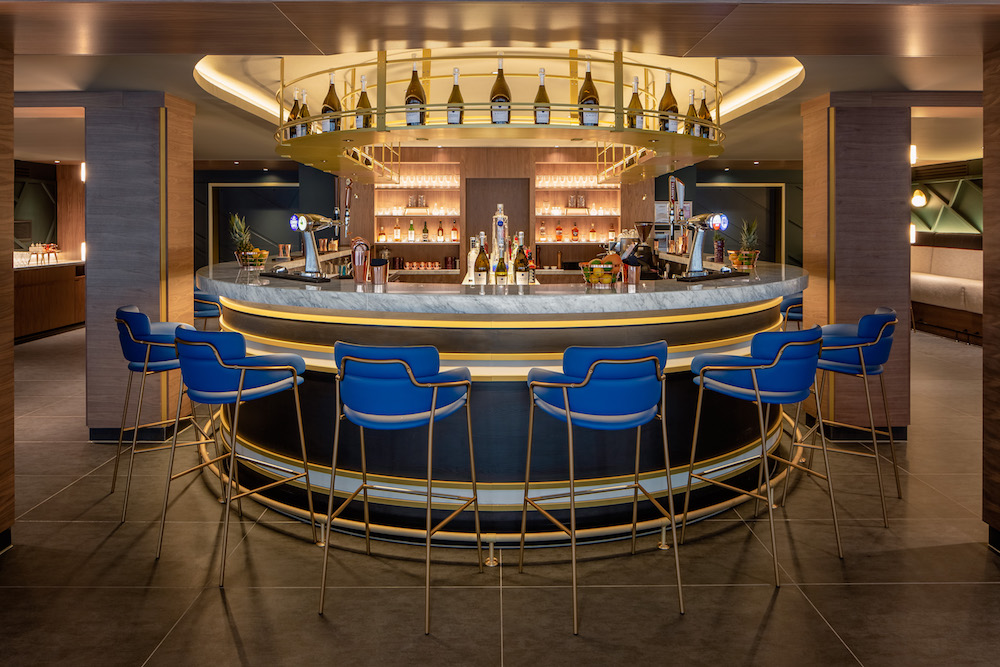
Image credit: YOTEL
So, what’s next for the outward-looking brand? Well, there seems to be no end to YOTEL’s vision. Considering that aparthotel growth is currently outpacing hotel expansion, the hotel group has launched YOTEL PAD, it’s answer to combine the best of serviced appartments with the hotel experience, again limiting unnecessary cost for both operator and guest. It has taken its deisgn DNA to expand the process, injecting compact design, while utilising space.
The new concept has already been rolled out across North America and soon to enter on the European scene in Lake Geneva. “The Lake Geneva region is a natural location to introduce YOTELPAD into Europe,” explains Viriot. “Centrally located and concentrating an unusually high proportion of global organisations, the region is home to an exceptionally mobile, dynamic workforce and welcomes frequent international business travellers, visiting their headquarters or attending conferences at the UN or elsewhere.”
YOTEL currently operates seven airport hotels in London Gatwick, London Heathrow, Amsterdam Schiphol and Paris, Charles de Gaulle, Istanbul Airport (2), Singapore Changi and seven city centre hotels in New York, Boston, San Francisco, Washington D.C., Singapore, Edinburgh and Amsterdam. YOTEL is expanding rapidly with new projects under development globally, including Porto, Glasgow, London, Dubai, Geneva, Long Island City, Miami, Park City, Mammoth, Atlanta and Melbourne.
Main image credit: YOTEL


